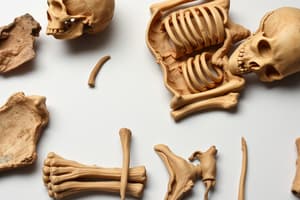Podcast
Questions and Answers
What is forensic anthropology?
What is forensic anthropology?
- The study of insects found on human remains.
- The study of ancient civilizations through their remains.
- The study of human remains to aid in identifying individuals and determining cause of death. (correct)
- The study of human behavior through cultural artifacts.
What is the role of forensic anthropologists in investigations?
What is the role of forensic anthropologists in investigations?
- To collect evidence from a crime scene.
- To interview witnesses and suspects.
- To perform autopsies on human remains.
- To identify physical markers on a skeleton to determine age, sex, stature, and race. (correct)
What is the significance of the pelvis in determining sex?
What is the significance of the pelvis in determining sex?
- It is only useful in determining the age of the individual.
- It is extremely useful in determining sex. (correct)
- It is only useful in determining the stature of the individual.
- It has no significance in determining sex.
What is the difference between biotaphonomy and geotaphonomy?
What is the difference between biotaphonomy and geotaphonomy?
What is FORDISC 3.0?
What is FORDISC 3.0?
What is the educational path to becoming a forensic anthropologist?
What is the educational path to becoming a forensic anthropologist?
What is the role of forensic archaeology in investigations?
What is the role of forensic archaeology in investigations?
Who are some notable forensic anthropologists?
Who are some notable forensic anthropologists?
What is the importance of upholding ethical standards in forensic anthropology?
What is the importance of upholding ethical standards in forensic anthropology?
Flashcards
Forensic Anthropology
Forensic Anthropology
Applies anthropological science in legal contexts to identify remains and assist in investigations.
Forensic Anthropologists
Forensic Anthropologists
Professionals who identify human remains and testify in court using skeletal analysis.
Skeletal Identification
Skeletal Identification
Estimating age, sex, stature, and ancestry from skeletal remains.
Forensic Taphonomy
Forensic Taphonomy
Signup and view all the flashcards
Biotaphonomy
Biotaphonomy
Signup and view all the flashcards
Geotaphonomy
Geotaphonomy
Signup and view all the flashcards
Forensic Archaeology
Forensic Archaeology
Signup and view all the flashcards
FORDISC 3.0
FORDISC 3.0
Signup and view all the flashcards
Ethical Standards
Ethical Standards
Signup and view all the flashcards
Study Notes
Forensic Anthropology: Applying Anthropology in a Legal Setting
-
Forensic anthropology applies the science of anthropology and its subfields in a legal setting to identify decomposed, burned, mutilated, or unrecognizable remains and assist in investigations and documentation of genocide and mass graves.
-
Forensic anthropologists work with forensic pathologists, dentists, and homicide investigators and testify as expert witnesses in court.
-
They use physical markers on a skeleton to determine age, sex, stature, and race, and can potentially determine cause of death, past trauma, and diseases.
-
Identification methods rely on past contributions of anthropologists and the study of skeletal differences through the collection of thousands of specimens and data on decomposition and its effects on the skeleton.
-
Forensic anthropology is a well-established discipline that assists in identifying remains and inputting physical characteristics into missing person databases.
-
Forensic anthropologists also investigate war crimes and mass fatality investigations, including the Rwandan genocide and the Srebrenica Genocide.
-
The field of anthropology began in the US and struggled for recognition as a legitimate science in the early 20th century.
-
Earnest Hooton and Thomas Wingate Todd made significant contributions to the development of physical anthropology, including the creation of the first large collection of human skeletons.
-
Wilton M. Krogman was the first anthropologist to publicize the potential forensic value of anthropologists in the identification of skeletal remains, and the US Army Quartermaster Corps employed forensic anthropologists in the identification of war casualties during the Korean War.
-
Anthropologists use their knowledge of osteology and the differences that occur within the human skeleton to determine sex, stature, age, and ancestry.
-
The pelvis is extremely useful in determining sex, while stature estimation relies on formulas based on sex, ancestry, and age.
-
Age estimation of living individuals is carried out by estimating the biological age using physical examination, hand/wrist development assessment, and dental assessment, while ancestry is typically determined by the shape of the maxilla and the size and shape of specific bones.Forensic Anthropology: Methods, Subfields, and Ethics
-
Forensic anthropology is the study of human remains to aid in identifying individuals and determining cause of death.
-
Anthropologists use various techniques to analyze bones, including age estimation, sex determination, and ancestry determination.
-
FORDISC 3.0 is a computer program that uses measurements of bones to determine ancestry, but has a low confidence level and is not always consistent.
-
Anthropologists can also examine other markers on bones, such as past fractures, to determine the type of trauma experienced.
-
Forensic archaeology involves the proper excavation of remains and recovery of evidence, as well as identifying potential grave sites.
-
Forensic taphonomy is the study of postmortem changes to human remains caused by environmental factors.
-
Biotaphonomy is the study of how the environment affects the decomposition of the body, while geotaphonomy examines how the decomposition of the body affects the environment.
-
To become a forensic anthropologist, one must obtain a bachelor's degree in anthropology and a doctorate in physical anthropology, with coursework in forensics and archaeology.
-
Forensic anthropologists must remain impartial during investigations and uphold ethical standards, including treating remains with respect and dignity.
-
Notable forensic anthropologists include Clyde Snow, William Bass, and Douglas Owsley.
-
Forensic anthropology is often used in police investigations and in identifying victims of mass disasters or human rights violations.
-
Research in forensic anthropology includes improving field methods and nondestructive methods of search and recovery.
Studying That Suits You
Use AI to generate personalized quizzes and flashcards to suit your learning preferences.




